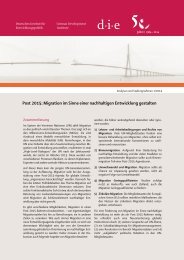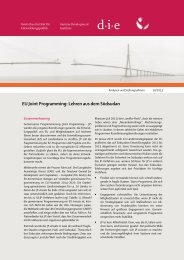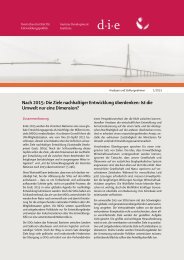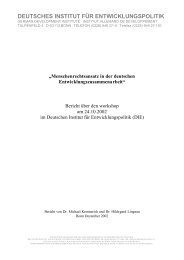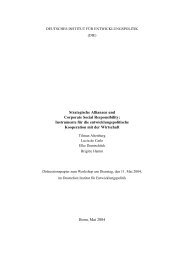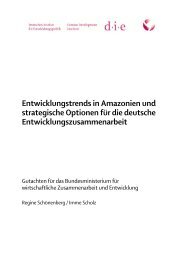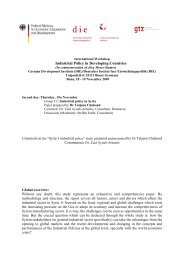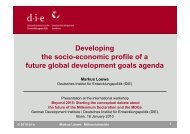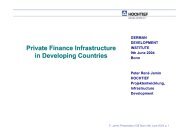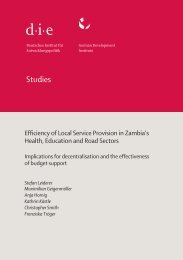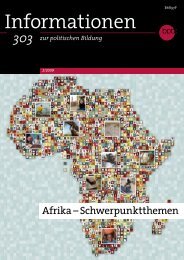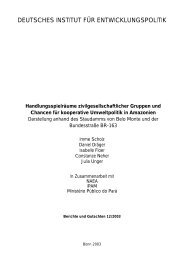Middle East / North Africa and the Millennium Development Goals ...
Middle East / North Africa and the Millennium Development Goals ...
Middle East / North Africa and the Millennium Development Goals ...
You also want an ePaper? Increase the reach of your titles
YUMPU automatically turns print PDFs into web optimized ePapers that Google loves.
Markus Loewe<br />
<strong>the</strong> Mauritanian government’s disposition to become active is at least not<br />
lower than that of o<strong>the</strong>r governments in <strong>the</strong> region.<br />
At <strong>the</strong> same time, it is not entirely clear from <strong>the</strong> perspective of <strong>the</strong> MDGs<br />
why Morocco <strong>and</strong> Egypt should keep <strong>the</strong>ir present status of priority partner<br />
countries. Both are middle-income countries that have far greater capacities<br />
to solve <strong>the</strong>ir own problems than e.g. Yemen or Mauritania, <strong>and</strong><br />
<strong>the</strong>ir problems are not quite as urgent to be solved as those of some o<strong>the</strong>r<br />
countries in <strong>the</strong> region (see Chapter 4).<br />
The reasons again why Algeria, Jordan, Syria, <strong>and</strong> Tunisia do not have <strong>the</strong><br />
status of priority partner countries are convincing. Just like Egypt <strong>and</strong> Morocco,<br />
<strong>the</strong>y are middle-income countries with moderate socioeconomic<br />
problems <strong>and</strong> average capacities to solve <strong>the</strong>m. The intention of <strong>the</strong> BMZ<br />
is to restrict DC with <strong>the</strong>se four countries to only one sector in each country,<br />
although in practice this is only <strong>the</strong> case in Jordan <strong>and</strong> Syria. In both<br />
countries, <strong>the</strong> priority field of German DC is <strong>the</strong> water sector. In Tunisia,<br />
German DC takes place in two sectors (environmental policy; economic<br />
reform <strong>and</strong> market systems development, <strong>and</strong> in Algeria, it even extends to<br />
three sectors (environmental policy; <strong>the</strong> water sector; economic reform<br />
<strong>and</strong> market systems development). One could ask why Tunisia is still receiving<br />
support in <strong>the</strong> form of DC at all. The fact that Tunisia is likely to<br />
reach almost all of <strong>the</strong> MDGs would be a convincing argument for discontinuing<br />
DC support for <strong>the</strong> country. One reason for not proceeding this<br />
way is that termination of DC with a country like Tunisia might seem to be<br />
a punishment for <strong>the</strong> development successes <strong>the</strong> country has achieved, <strong>and</strong><br />
this could prove to be a negative incentive for <strong>the</strong> commitment of o<strong>the</strong>r<br />
countries. Fur<strong>the</strong>rmore, DC with countries already on <strong>the</strong> road to success<br />
can sometimes achieve more than DC with poor countries that are far more<br />
reliant on external support, even though <strong>the</strong>y are without <strong>the</strong> requisite institutional<br />
structures <strong>and</strong> <strong>the</strong>ir politicians may lack commitment.<br />
5.2 Definition of sector priorities<br />
Against <strong>the</strong> background of <strong>the</strong> MDGs, <strong>the</strong> sectoral orientation of German<br />
DC with <strong>the</strong> MENA countries can also be seen as very largely reasonable.<br />
In its priority areas German DC is in a position to provide important contributions<br />
to <strong>the</strong> achievement of <strong>the</strong> MDGs. However, it is not engaged in<br />
all fields that are crucial for this purpose.<br />
126 German <strong>Development</strong> Institute



